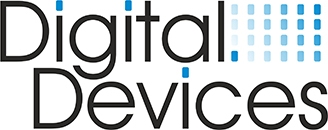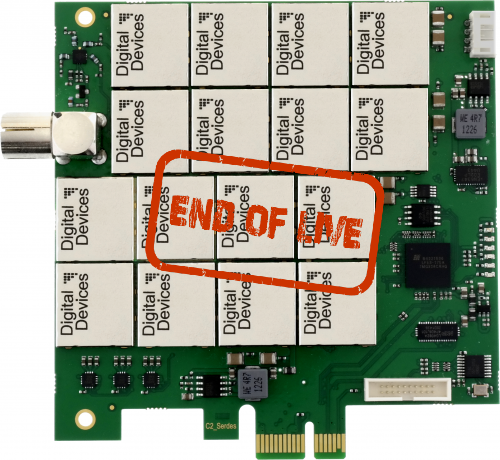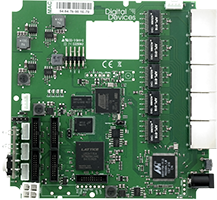DVB-C/C2/T/T2 Tuners
- 8x DVB-C/C2 (cable tuner) or
- 8x DVB-T/T2 (terrestrial tuner)
- Watch one channel and record another channel simultaneously
- Live TV
- Timeshift
- Timeshift
HDTV H.264/MPEG4 – 1080p
Support many TV Applications
- Microsoft Windows® Media Center 7/8
- DVBViewer, Media Portal, Gen2VDR, MythTV
Differential Data Transmission
- Prepared for differential connection of data cables (LVDS) > 400% more throughput (required for UltraHD transponders)
- Downward compatible to existing data transmission of 80 Mbit
Expandable Modular System
- Connection to Octopus NET (20-pin data cable)
DVB-T2 Specifications
- DVB-T2 specification versions: 1.1.1, 1.2.1 and 1.3.1
- DVB-T2 base profile
- DVB-T2 lite(!) profile
ISDB-T Characteristics
- Conforms to ARIB STD-B31
- 6 MHz, 7 MHz and 8 MHz BW support
- Excellent phase noise resistance
- Excellent multipath equalization performance
- Automatic detection of mode/guard interval lengths
- EWS (Emergency Warning System) flag output
Unicable (Master/Slave)
- One antenna cable supports all tuners
Suitable for Dense Cases
PCIexpress
- Connection via PCIe x1 up to x16 slot
GT-Link Port
- To connect to Octopus NET (data rate > 1 Gbit)
- Notice: Connect to PCI Express or GT-Link port
Green IT
- Power consumption max. 16,3 W, active cooling required
- No use of tantalum capacitors
- No use of electrolyte capacitors
Supported Operating Systems
- Microsoft Windows® 7/8(.1)/10
- Linux (Kernel 2.6.34 and higher)
DVB-C Specifications
- Frequency range: 51 – 858 MHz
- All modulation and code rates according to DVB-C specification
- Symbol rates of 0.87 – 6.9 MBaud
- Sensitivity: 47 dbµV (64QAM), 47 dbµV (256QAM)
DVB-C2 Features
- Demodulation
- 16, 64, 256, 1024, 4096 QAM
- 2/3, 3/4, 4/5, 5/6, 8/9, 9/10 code rates
- 1/64 and 1/128 guard intervals
- 8 MHz and 6 MHz channel bandwidths
- Data Slices Types 1 & 2 supported
- Data Slice width up to 7.61 MHz
- Stream processor for automatic common-PLP and data-PLP combination
- FEC Header Type
- Robust mode
- High Efficiency mode
- Notch Support
- Narrowband and broadband notches
- Reception of narrow channels down to 2 MHz between broadband notches
- Time interleaving modes 4, 8 symbols and ‘best fit’
DVB-T/T2 Specifications
- Frequency range: 49 – 861 MHz, 2k & 8k OFDM
- All modulations according to DVB-T and DVB-T2 specification
- Sensitivity: -83.0 Bm (16-QAM&3/4)
ISDB-T Characteristics
- Conforms to ARIB STD-B31
- 6 MHz, 7 MHz and 8 MHz BW support
- Excellent phase noise resistance
- Excellent multipath equalization performance
- Automatic detection of mode/guard interval lengths
- EWS (Emergency Warning System) flag output
Standard Connectors:
- PCI Express
- IEC connector (Input)
- 1x 20 pin data interface with differential connection of data cable (LVDS) at the Octopus NET downward compatible for classical data transfer with 80 Mbit
Green IT
- RoHS compliant
- WEEE DE 99353762
Power Consumption Typical
- DVB-T2: 16.2 W (worst case -80 dBm QAM256 7/8)
- DVB-C: 13 W
- Notice: active cooling required, passive cooling is not enough
Supported Operating Systems
- Linux (ab Kernel 2.6.34)
- Microsoft Windows® 7 (32/64 Bit) (incl. Windows® Media Center)
- Microsoft Windows® 8 (32/64 Bit) (incl. Windows® Media Center)
- Microsoft Windows® 10 (32/64 Bit)
System Requirements
- Dual Core Intel® or AMD® CPU
- 512 MB RAM
- 1x PCIe slot (x1 up to x16)
Dimensions
- L 104 mm, W 111 mm, H 15 mm
Octopus NET Rack
Through the GT-Link Port of the Octopus NET Rack can be connected to the Max A8 or Max S8.



